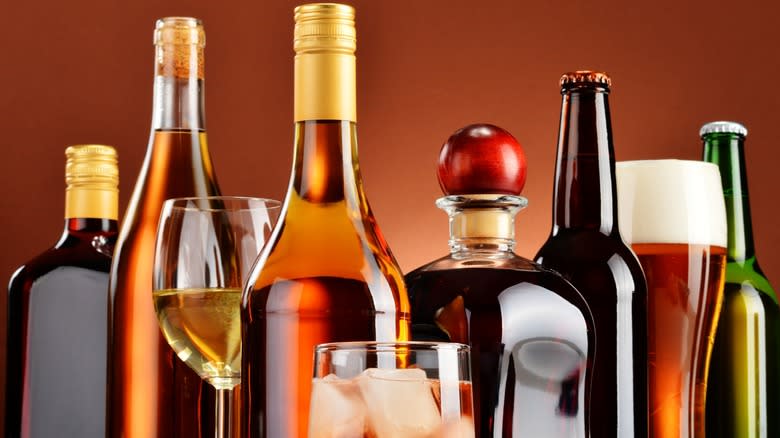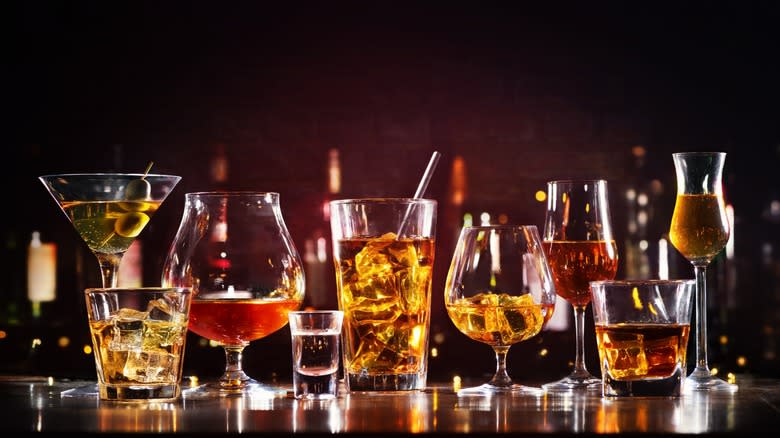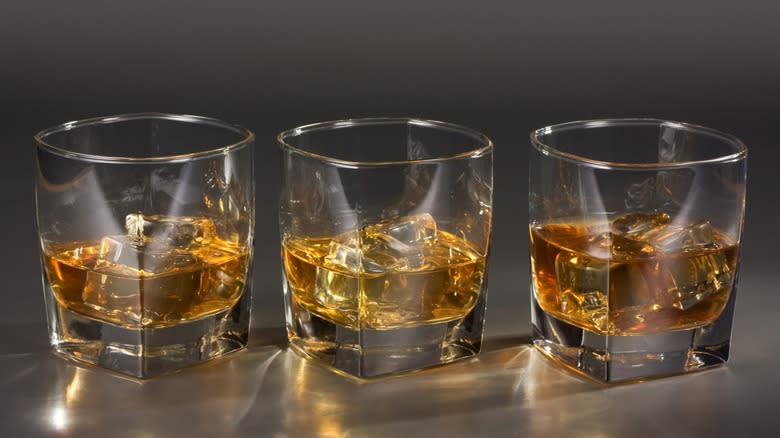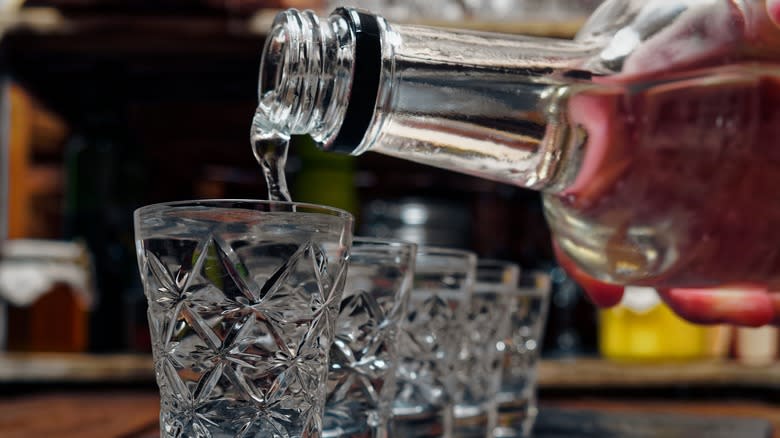Is There A Difference Between Liquor And Spirits?

Although sipping on a drink comes easily, associated terminology is more than a little complicated. From all the elaborate cocktail names to discussions about the best type of spirit, and even cocktail strainer nomenclature, it's fair to say there are many alcohol-related terms to keep in mind. Throw in the fact that some -- but not all -- types of alcohol are subject to stricter regulations, like Denomination of Origin, and the indefinite nature of titles only keeps escalating. Such is the case for two of the most fundamental labels: spirit and liquor.
Both carry associations of the strongest booze stuff, distilled to full-proof "hard alcohol" intensity. They refer to those classic bottles like vodka and whiskey, found readily in nearly every bar. And although "liquor" and "spirit" are separate terms that are often used interchangeably, they essentially allude to the same type of distilled alcoholic liquid, which is either used as a building block in mixed drinks or sipped neat. Their murky differentiation showcases the breadth of alcohol in existence, with many varied expressions produced worldwide. Still, there are a few nuances to keep in mind.
Read more: 13 Liquors Your Home Bar Should Have
What Is A Liquor?

Liquor is a wide-ranging term for alcoholic beverages that are not manufactured through the processes of brewing or wine-making. The term is nearly always interlinked with distilled beverages, referencing a specific method of increasing alcoholic content through a series of evaporations with fermented material. Fruits and starches are the most common bases -- fruits are used for brandy, agave for tequila, and potatoes for some vodka. The result is that boozy hard stuff essential to your home bar that can be employed in cocktails or consumed neat.
Keep in mind that liquor and liqueur are different; the latter is a sweetened and flavored drink made from liquor and other ingredients. It's typically less alcoholic and is infused with intriguing flavors made from herbs, spices, or fruits atop a liquor base. Specifically, the addition of sugar is what sets this type of alcohol apart. After all, liquors like gin can also have flavored additions.
As a result, there is some gray area with terms like alpine liquor, which refers to both liqueurs and liquors crafted with mountainous ingredients. Names like malt liquor can also be a bit misleading as this type of alcohol is brewed, making it more beer-like than other liquors.
What Is A Spirit?

The term spirit often refers specifically to a distilled alcohol that doesn't have any sweeteners added. In the U.S., spirits are well-regulated by the Alcohol and Tobacco Tax and Trade Bureau (TTB). Inspect a bottle closely, and it'll note the contained alcohol percentage, place of origin, and importer's name. It will also categorize the alcohol within into a specific style.
Cornerstone spirits include rum, vodka, tequila, brandy, gin, whiskey, and a few more that defy such simple categorization. Each is characterized by its unique production intricacies, as well as more definite subcategories, like the easily misunderstood and frequently misspelled whiskey and whisky. Regardless, the renditions typically hover around 40% alcohol by volume (ABV), although they can go over 90% ABV for Everclear and overproof expressions.
On the opposite end of the scale, "light" spirit expressions can drop as low as 20%, showcasing the varied breadth of alcohols encompassed by the term. Nevertheless, the name "spirit" dependably refers to alcohols produced via distillation, meaning a bottle sold as a spirit will almost always have a strong, boozy bite.
Liquor And Spirit Ultimately Refer To The Same Drink

While a few subjective differences circulate between liquors and spirits, most people and purveyors use the terms to denote the same thing. Ask a bartender for their favorite liquor, and they'll likely name something that's a spirit, too. Some suggest that the term spirit also encompasses distilled alcohols that aren't drinkable, plus any sweetened liqueurs, although such differentiations aren't consistent. Most dictionary entries define the two terms in the same way, so don't stress the details.
Confusion arises because "liquor" is also a colloquial term for booze, meaning many beverages are casually associated with the name. For example, when you think of a liquor store, an establishment selling a range of alcoholic beverages likely comes to mind. Yet, head to a spirits bar, and it's evident that distilled drinks are the theme of the night. Throw in confusing legal nomenclature and gray areas -- like the whisky liqueur Drambuie -- and it's understandable why the terms become disjointed. So, to guarantee that you crack open the bottle you desire, be sure to pay close attention to the specific characteristics listed on the label.
Read the original article on Tasting Table.

